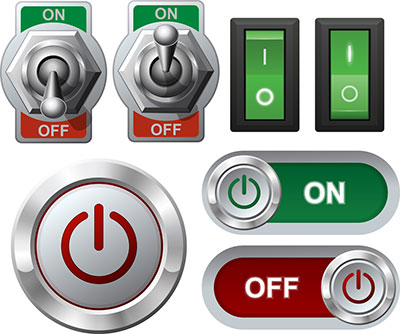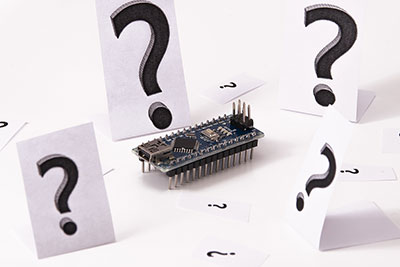1. What is a Switch?
A switch is a simple electrical device that breaks or closes a connected circuit. It does so by disrupting the current path and connecting or disconnecting any appliance it serves.
In doing so, there’s also an interruption of electrical current between a device and a power source. Moreover, you can operate it as a sensing element (like the ones in a thermostat) or manually by pressing (like a momentary switch).
Some specialized forms or types of switches include;
- Circuit breaker switch,
- Relay switch,
- Reversing switch,
- Toggle switch,
- Pushbutton switch and
- Rotary switch.
Further, there are four main methods of operation of the switch circuit. They include;
- DPDT (Double pole double throw switches),
- DPST (double pole, single throw),
- SPDT (single pole double throw) and
- SPST (single pole single throw switch).
We will give out more details as we proceed.
2. Switch Circuit Symbol Introduction
The examples listed below are switches that majorly fall under mechanical and electrical controls.
Furthermore, they are physical switches; you can activate them by pressing, releasing, or touching their contacts.
Limit switch
(Limit switch )
A limit switch functions by any machine’s mechanical part that controls the systems. In addition, coming into contact with its actuator activates it by machine parts or other electric objects.
Switch DPDT
(Switch DPDT)
It consists of two SPDT switches conjoined with a standard lever and can switch two circuits simultaneously. Sometimes, it is equivalent to a simple on-off switch of 2 SPDT switches.
Generic switch symbol
(Generic switch symbol)
It’s simply a generic switch when in an open condition.
Telegraph key
(Telegraph key )
It is a switch symbol with a special designation for transmitting text messages in Morse codes.
It achieves transmission by disconnecting or connecting the circuit switch. Then, it makes pulses of different lengths termed ‘dits’ and ‘dahs.’
Closed switch
(Closed switch )
The symbol shows a closed switch that denotes a complete circuit that allows current flow.
Differential switch
(Differential switch )
A difference between a neutral line current and a phase line current contributes to the operation of the differential switch. Thus, any difference in current that occurs because of fault current breaks the circuit.
Open switch
(Open switch )
An open switch stops the flow of current by breaking the circuit.
Pulse counter switch
(Pulse counter switch)
A pulse counter operates the actuator in the pulse counter switch. When it reaches a specific fixed value, it activates the button that triggers the circuit.
Thermal magnetic switch
(Thermal magnetic switch )
A thermal-magnetic switch uses both thermal and electromagnetic braking, and the electromagnet instantly breaks the circuit in case there’s a high current surge.
Then, if there’s an excess of the current limit, a bimetallic strip component offers a delay.
DIP (Dual Inline Package) switch
DIP (Dual Inline Package) switch
A DIP switch is commonly used in printed circuit boards because of its small size. The manufacturing process involves packing together multiple switches in a DIP.
Timer switch
(Timer switch)
When a timer runs out, the timer switch makes and breaks the circuit contact, creating a time delay in some applications.
Float switch
(The Float switch)
Float switches detect liquid level and turn off or on depending on the liquid fall and rise.
NO (Normally Open) push button
(NO (Normally Open) push button)
Often, it’s in a constant OFF (open) position. A pushbutton switch puts the switch ON (closed place), whereas releasing the button retrieves it to its initial OFF position.
Rotary open switch
(Rotary open switch)
The symbol signifies a rotary switch in its OFF/open position.
Switch SPDT
(Switch SPDT)
It consists of three terminals, with a common terminal and two others. Then, one of the two terminals connects with the common terminal. Also, it is recommendable in three-way circuits like turning a light off or on in two separate locations.
Switch DPST/ Dual ON-OFF switch
(Switch DPST/ Dual ON-OFF switch)
It can accommodate two different circuits since it has two poles and instantly switches them OFF and ON.
Moreover, due to its one throw, it has a single closed-loop/ON position. It also regulates appliances with 240V.
Switch SP4T
(Switch SP4T)
It has four throws and one pole. Its four positions enable it to switch a circuit after connecting the switch with one of the four terminals.
Pushbutton Single pole double throw
(Pushbutton Single pole double throw)
A pushbutton SPDT has no open position but is in the ON state in the two conditions.
NO thermal switch
(NO thermal switch)
The switch operates at room temperature and gets activated when the temperature rises.
NC thermal switch
(NC thermal switch)
Its state at room temperature is at a closed/ON switch. However, when the temperature increases above a particular level, the switch becomes open/OFF.
Foot-operated switch
(Foot-operated switch)
They often drive heavy machinery.
Selector switch
(Selector switch )
It can switch a single circuit or more but at different times.
Mercury switch
(Mercury switch)
Its tilting motion can open and close up a circuit.
Joystick switch
(Joystick switch )
Its base is connected to a stick or lever. It’s also used in applications such as industrial trucks, cranes, and gaming controller pads.
ON delay switch
(ON delay switch )
The ON delay switch postpones the time it takes when switch the circuit from OFF to ON.
NC push button
(NC push button )
It’s always constant at the ON/ closed position. If you press the NC push button switch, it gets into an OFF/open position, whereas releasing the button returns it to a closed state.
Switch SPST/ Toggle Switch
(Switch SPST/ Toggle Switch)
It is the simplest form of an electrical switch with only one output and one input. Therefore, the single pole switch is common in most electric circuit software.
Summary
In conclusion, knowing about switches and pushbutton symbols is imperative when setting up electrical projects.
In this way, you’ll learn to easily interrupt electric current or divert it from one conductor to another in your circuit operation.
The billions of operations can comprise devices like audio amplifiers and motor drives.
Finally, this article has provided you with a variety of switch circuit symbols and descriptions. Since we’re always open to questions or clarifications, you can reach out to us.





